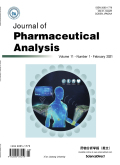首页|期刊导航|药物分析学报(英文)|Dynamic gut microbiome-metabolome in cationic bovine serum albumin induced experimental immune-complex glomerulonephritis and effect of losartan and mycophenolate mofetil on microbiota modulation
Dynamic gut microbiome-metabolome in cationic bovine serum albumin induced experimental immune-complex glomerulonephritis and effect of losartan and mycophenolate mofetil on microbiota modulation
Wenying Shi Zhaojun Li Weida Wang Xikun Liu Haijie Wu Xiaoguang Chen Xunrong Zhou Sen Zhang
药物分析学报(英文)2024,Vol.14Issue(4):562-577,16.
药物分析学报(英文)2024,Vol.14Issue(4):562-577,16.DOI:10.1016/j.jpha.2023.12.021
Dynamic gut microbiome-metabolome in cationic bovine serum albumin induced experimental immune-complex glomerulonephritis and effect of losartan and mycophenolate mofetil on microbiota modulation
Dynamic gut microbiome-metabolome in cationic bovine serum albumin induced experimental immune-complex glomerulonephritis and effect of losartan and mycophenolate mofetil on microbiota modulation
摘要
关键词
Immune-complex glomerulonephritis/Gut microbiome/Metabolomics/Fecal microbiota transplant/Tryptophan metabolismKey words
Immune-complex glomerulonephritis/Gut microbiome/Metabolomics/Fecal microbiota transplant/Tryptophan metabolism引用本文复制引用
Wenying Shi,Zhaojun Li,Weida Wang,Xikun Liu,Haijie Wu,Xiaoguang Chen,Xunrong Zhou,Sen Zhang..Dynamic gut microbiome-metabolome in cationic bovine serum albumin induced experimental immune-complex glomerulonephritis and effect of losartan and mycophenolate mofetil on microbiota modulation[J].药物分析学报(英文),2024,14(4):562-577,16.基金项目
The authors acknowledge the funds by the Chinese Academy of Medical Sciences Innovation Fund for Medical Sciences(CIFMS),China(Grant No.:2022-I2M-1-014),the National Natural Science Foundation of China(Grant No.:82293684),Beijing Natural Science Foundation,China(Grant No.:L232084),and the National Key R&D Program of China(Grant No.:2022YFA0806400). (CIFMS)

